View the entire case study on the desktop version of this webpage joshuadema.com
batyr
Designing an inclusive service to build community resilience and personal resilience for Australians in regional and remote areas













Short on time?
Quick Summary
1. Problem
batyr needs a way to connect their existing services to areas in regional Australia.
batyr wants to find a way to build community resilience and decrease stigma around mental health

2. Research Insights
Regional areas tend not to trust external companies who come to deliver programs. Small towns and cities are 'run' by their community advocates, such as council, sporting and education services
3. Solution
We designed an inclusive program to connect communities including an app to facilitate peer to peer sharing of experiences and support.
Project Overview
batyr is a 'for purpose' organisation that focuses on preventative education in the area of youth mental health. The organisation provides programs that train young people to speak about their personal experience with mental ill health and start a conversation in their community.
Their programs engage, educate and empower the audience to learn from the experiences of others and to reach out to the great services around them.
My Role
Tools
The Team
UX Designers
Josh Dema
Felipe Gorsten
Service Designers
Paula White
Robert Bruno
Figma
Miro
Pen and Paper
Adobe Illustrator
UX Research
Interviews
Ideation
Rapid Prototyping
Wireframing
UI Design
Usability Testing
Time Frame
2 Weeks
The Brief
Utilise new technologies to build connection and resilience in communities so they are more equipped to provide early interventions through peer-to-peer mental health support when responding to crises.
Our Process
We followed the Double Diamond from end to end, delivering a high fidelity app prototype and a service blueprint at the end of the two week sprint

DISCOVER & RESEARCH
Ecosystem Research
6
one-on-one
Interviews
3
Batyr Staff Interviews
&
Desktop Research
Diving Deep into existing research
batyr provided us with a number of documents to help us quickly learn about their mission and process.
1. "Children and Young People's Experience of Disaster" from the office of the Advocate for Children and Young People (ACYP)
2. batyr - Thematic Analysis, Insights and Recommendations Regarding Storytelling
3. batyr - Framework for Youth Support for Bush-Fire Effected Communities
What builds community resilience?
The first piece of the puzzle that we needed to wrap our heads around was how exactly is resilience created in a community? Especially in the context of disaster resilience.
The Australian Institute for Disaster Resilience outlines the interrelationship of the three fields that are required to build community disaster resilience.
After learning that Emergency management and Disaster risk reduction are more related to physical preparedness, we chose to focus in on Community Development


The ACYP Disaster resilience framework and document informed a lot of our understanding of how resilience is created in community.
“Greater connection to community enhances resilience and increases access to supports and services. It promotes information sharing and collective responsibility to mitigate the negative impacts of disaster, whilst increasing the likelihood of timely recovery once the immediate effects of disaster are over, leading to restoration of independence and enhanced autonomy.”
Resilience
The research process sent us looking far and wide! I've summarised our key findings on resilience below:
What creates resilience?
Sense of purpose
Cohesive community
Access to recreation
Education and employment
Having a voice
Schools focused on wellbeing
Support services
Access to nature
What disintegrates reslience?
Disconnected community
Limited access to mental health
Cumulative disasters
Destruction of nature
Lack of school support
Lack of support services
Bullying
Drug and alcohol use
1:1 Interviews
We completed three interviews with batyr staff members to talk about their current programs and challenges and six interviews with a range of people from remote towns, spanning residents, local leaders, and mental health workers.
Ben Hearn, Community Programs Officer at the Campaspe Shire Council Echuca (VIC) revealed to me a lot about the stigma surrounding mental health in regional areas, and the trouble he has engaging the youth in his region.

"There is a huge gap in empathy and understanding in the community"
- Ben
We synthesized our findings from our interviews and desktop research using an affinity map
This all started to create a more cohesive problem area and formed some key themes, including:
-
Challenges in keeping community alive
-
Youth perspective
-
Difficulty bringing in outside facilitators
-
Community Stigma Towards Mental Health
Affinity Mapping
DEFINE
Redefining the brief
Looking back at the original brief, we recognised these themes could fit well within the Batyr Bushfire Response Plan. So we redefined the brief to focus on regional/remote areas
The New Brief
Utilise new technologies to build connection and resilience in regional communities within the existing bushfire response plan so that they are more equipped to provide early interventions through peer-to-peer mental health support.

Team checking in with Batyr Staff
Who are we solving for?

With all our findings we outlined that there were two groups of people who we could solve for.
1. Young people
2. Community Gatekeepers
We identified some of their pain points and validated that the biggest barriers were Stigma around mental health, and an inability to build trust with external facilitators
Where do we fit in?
batyr have a number of existing programs targeting mental health resilience, with proven success in Metropolitan NSW.
We knew that we wanted to help them target regional areas, but how would our new solution tie in with what they already had?
Below we have visually represented our findings about the current offerings at batyr, including the 'being herd' program. You can see where we identified an existing roadblock.
Reaching out to rural and regional communities can be difficult unless you can access the gatekeeper and bring them onboard with the programs benefits.
batyr's Current Programs
batyr 'Being Herd' Program
Being Herd is a free two-day workshop that empowers young people (aged 18-30) to give a voice to their story of mental-ill health.
batyr "AMPLIFIED VOICES" APP
The amplified voices app is a tool to encourage sharing of stories between youth
It is currently in development and has not been released (at Sept 2020)
batyr Current Ecosystem

In this diagram you can see; Batyr accessing the community gatekeepers whether that be a teacher in a school, a council representative in charge of community events or even a football coach.
Once the gatekeepers are onboard Batyr can deliver the being herd program to the young adults, and hopefully encourage them to use the amplified voices app and share their own stories.
But what if we could do more with these community gatekeepers, when we find them? We felt that the community gatekeepers could play a bigger role in supporting Batyr and reaching young adults.
What if the community gatekeepers could become advocates for Batyr?
Proto-Persona
Meet James
What does a community Gatekeeper look like?, what do they do? and what part do they hold in the community?
We produced a proto-persona to answer these questions
James is an example of a key gatekeeper in the community the we could target to carry the batyr flag!
James works for the council as a community development coordinator and has access to the wider community enabling him to build connection and foster resilience within that community

James is..
-
A caring & trustworthy person, who is generous with his time, for the benefit of others.
-
Ambitious and focused on self improvement to be a better person.
-
Conscious about his role in the community, and feels his community is disconnected and he wants to make an impact.
-
Aware of the hardship young people are facing and wants to help, support and inspire them.
How Might We
With our users defined it was time to write up out HOW MIGHT WE statements.
HOW MIGHT WE
Equip the community to take charge of their mental wellbeing and reduce stigma so that they become self-reliant/independent from outside support services
HOW MIGHT WE
Encourage community advocates (gate keepers) to build connections with multiple communities,
in order to foster resilience
HOW MIGHT WE
Empower residents in rural/remote communities to collectively be better prepared for crises
DEVELOP
Ideation
In a process called crazy 8’s, the team generated one idea per minute for 8 minutes, this resulted in 40 creative ideas between us.
We grouped these ideas into categories, such as community hub, crisis preparation, and personal mental health, to name a few.
In order to narrow down our scope the team voted on ideas that would be most beneficial and desirable for community leaders.


Ideas specific to the digital space were about ‘preparation & readiness', some of our ideas:
-
A mental wellbeing app for communities
-
Gamification of community tasks and activities
-
A disaster preparation app, that would track crisis preparedness
-
An “advocate to advocate” app that would allow sharing of ideas and resources to build connection.
We though back to James’ frustrations around of lack of community engagement....
It was from here we decided that the digital ideas could combine together into a single mobile app to help James build resilience and connection in his community.
Mobile App: The Digital Touchpoint
But people don't just download an app because you tell them to..!
Our next challenge was incentivising James to use the app and provide him with a sense of purpose.
We wanted him to not just benefit the community but also benefit himself.
Our goal was to help James harness the power of the app to create a unified ecosystem of leaders, sharing past experiences and resources with the one focus of building resilience within remote communities....

The Ambassador Program
At this point we zoomed out, to think about how these app features could fit into a new ecosystem solution for Batyr.
We came up with the batyr Ambassador Program

The proposal is a program to connect leaders from different communities to share their lived experiences, resources and strategies so they can foster resilience within a community.
Recruited ambassadors will bring communities together by supporting young adults to have a voice and implement disaster recovery processes.
Their connection with other community ambassadors will be facilitated through the app, where past and present disaster experiences, strategies, tools and methods are shared with one another so that the community is better prepared.
The app will be James’s tool to help him build resilience and connection in his community, but it is just one touchpoint in his experience with the community.
Benefits for James
-
Surrounded by like minded people
-
Feeling empowered to make a difference
-
Create a sense of purpose
-
And finally he feels more engaged with what other communities are doing to combat mental health
Benefits for batyr
-
Increase Wider presence
-
On the ground, local ambassadors developing the Batyr network
-
Increase trust in mental health services
-
Spread the Batyr vision
Benefits for the Community
-
Bringing more visibility to mental health challenges
-
Increase community resilience
-
Shared goals and vision
-
And more community events
Defining our Customer Value Proposition
At last we were able to define our goals in one statement

Batyr Ecosystem

Below we have outlined a proposed ecosystem of the Ambassador program.
We see James sitting within his community, surrounding by young adults and fellow community members.
Notice the blue line This is the connection from Ambassador to Ambassador, positioned within their own silo communities, sharing their knowledge and experiences to help build resilient communities. Our focus moving forward will be on this connection.
Here's where our team split into two
With our understanding and values well-aligned, our team split into two teams, SD and UX.
Service Designers, Robert, Aleksandra and Paula focused on fleshing out the entire service and creating a service blueprint.
UX Designers, Felipe and myself went off and worked on designing an app that would sit within the proposed ambassador program.
UX DELIVERABLES
AN APP TO...
An app for the ambassador to encourage growth of personal resilience and community resilience. The app will facilitate connections and provide resources to the user.
The app will:
-
Foster connectedness in the community
-
Build a sense of purpose
-
Reframe mental wellbeing as a part of overall resilience
-
Gamification - tracking mechanism for Batyr
-
Interlink with Batyr's existing "amplified voices" app

USING an MVP Matrix we considered our digital features on a scale of value to our user vs. ease of implementation
The most valuable features to include were:
-
A network feature, to connect ambassadors with their community
-
A way to connect Ambassadors to other ambassadors.
-
A dashboard to track personal resilience and community resilience.
-
A volunteering function to stimulate community connection.
Some other ideas that were identified as having less impact were:
-
Tele-mental health
-
Disaster prediction
-
Crisis preparedness
Our Prototyping & Testing Process
Our prototyping and testing process is iterative, which means we are testing and refining our ideas as we are designing.
-
Our process starts by sketching concepts on paper
-
Using these concepts we design a low-fidelity prototype
-
We conduct usability testing to collect impressions and feedback
-
We implement changes and move to the next round of iterations
This process repeats until we arrive a the high fidelity prototype.

LOW FIDELITY






2
Usability
Tests
"So what is readiness? What am I ready for?
"Use the language that people use"
"Need to stay away from disaster preparation, there are other resources for that"
"I haven't worked out what that app does yet"
5.5/10
Average Rating
In low fidelity, we’re looking to test the perceived value of our features, and check that our key principles are being addressed.
In our testing we found that people were not immediately sure what the app was for, and there was some unclear text and iconography around resilience.
We were reminded to use language that was appropriate for the audience, and to remember that members of the community may have English as a second language.
It was suggested that we steer clear from being a “crisis preparation app”, as each state in Australia already has a service like this, and disaster information needs to come from “one source of truth”.

MEDIUM FIDELITY
.png)
.png)
.png)
.png)
.png)
.png)
"I love the reframing of mental wellbeing as part of overall resilience - it will help break down stigma"
"I like the link between individual and community wellbeing"
"It not only connects, but it gives people practical ways to help"
3
Usability
Tests
In this round we picked up on some interesting details.
Testers were starting to see the link between community resilience.
The reminded us that the community leader is usually a person who ALREADY gives a lot of themselves, we should encourage self-care as part of the tasks in the app.
Being in the mental health space, we needed to ensure that we provided links to places that offer mental health support, just in case users needed to refer someone to a professional
7/10
Average Rating

"You need to be careful not to promote burnout by incentivising point-scoring"
"Give them points to take a break too"
"What happens with I reach 100%?"
"It needs a stronger link to professional support"
UI and VISUAL DESIGN DECISIONS
Using a colour theme throughout the app we wanted to create the following associaitons:
-
Blue - Me/Personal resilience
-
Orange - Community tasks and community resilience.
-
Purple - Notifications, CTA's
-
Purple with gradient - Progress tracking
The aesthetics were appreciated during testing
One user commented: "there is a lot of softening that you have done with the [colour and shape], and in the mental health space, this is really warm and inviting, it works well"

HIGH FIDELITY

2
Usability
Tests
"I really love the idea of the scoring system"
"I really like the aesthetics of it"
"I like how it visualizes the support network, it's my favorite part of the app!"
"You know that as an ambassador you are supported by those around you"
As always there was some room for improvement...
-
Some testers didnt understand how to log wellbeing activities, and how the percentage score worked
-
A tester from outside the ‘batyr world’ was unsure what “Have a Voice” was all about.
-
And in the context of this app, people felt they would benefit more from seeing local events to attend, rather than weather information.
With our final improvements would be focused on:
-
Simplification of wellbeing activities
-
Rethinking the scoring system (moving away from percentages)
-
Further clarifying the language
8.5/10
Average Rating

"I don't understand the logging of wellbeing activities"
"I would rather see local events over weather information
"I don't really get the percentages"
"I don't understand what 'have a voice' is meant to do"
DELIVER


After our final round of iterations, we progressed to our High fidelity prototype.
On the home screen James can access all the important features on the app.
Depending on what action he wants to take he can focus on the Blue (me) flow or the Community (Orange) Flow
The life ring provides a direct link to mental health support, if required
We utilised overlays in this design to explain features to a new user.
Informative overlays can be opened by tapping the grey
( i ) button
Who would have thought we'd be gamifying community and personal resilience!
Our testing subjects really liked the visual way these were displayed, and reported they would feel motivated to check in on progress

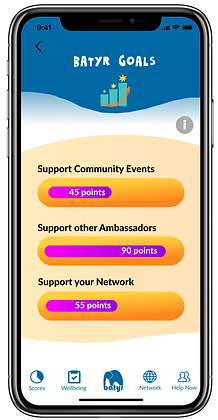

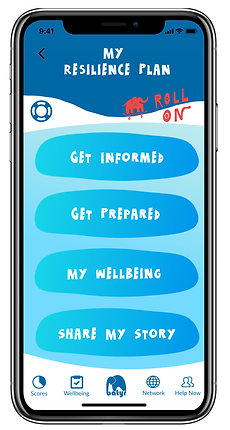
My Resilience Plan
This screen ties up personal mental health as being a part of 'overall preparedness'
We validated that this method would be effective in engaging people in remote communities where stigma towards mental health is high

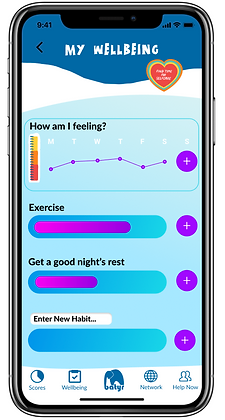


My Community
Here is where community resilience is built in a practical way.
The app user can find a job to do out in the community, donate, or lend items

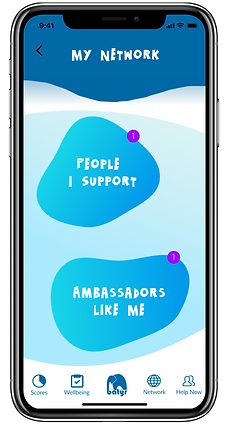
My Network
James can easily keep in touch with his close support network, the app will remind when he has not spoken with someone for a while.
For example, James can check in with friend Louise through a call, message, or sending a pre-written story.
James will earn community points for this task


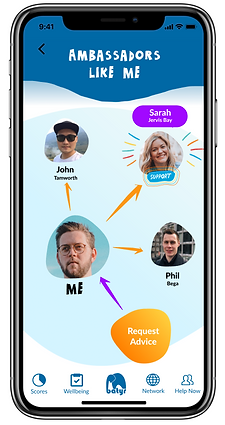

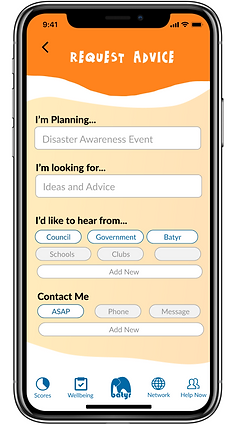
Ambassadors like me
To strengthen networks between communities, James is encouraged to both ask for, and receive advice from other leaders in local towns.
Ask for help
One important new feature was to include the Life Ring icon on the Support page, quickly linking users to mental health support if needed
As you can see here on Sarah’s page, James is able to send her support if he identifies that she needs it, before, during or after the contact happens.


You made it to the end!
Dying to see how this app
fits into our proposed ecosystem?

FEEDBACK AND REFLECTION
The client had some encouraging words of thanks for us
I’m blown away by the concept you and the team have put forward, and by the incredible depth of research and testing you were able to validate this idea with in just two weeks.
I’ve already had initial conversations with senior management about next steps towards implementing a platform like the one you have designed.
Congratulations to you and the team! I’ll be sure to keep in touch to update you as we hopefully progress this concept|
Batyr - Isaac
I just wanted to say a sincere thank you again. I've been working in this batyr space for sometime now I've always been hoping we could come up with innovative ways of engaging our regional herd.
What you have all achieved is such a beaut spot for us to continue to explore and action.My country kid self is so excited!!
Batyr -Courtney
I'm so proud of the work we produced in the mental health resilience space.
Working in a combined SD and UX team was a great insight into how overall strategy of a project works and how important it is to have a zoomed out view of the project to ensure you are adding value
What I did well
-
Depth: We went really deep into the research in this project, it was a crutial factor in our success and and good reminder to never skimp on research!
-
Collaboration: All five members of the group worked well together, listening to each others voices and ideas throughout the process. This is something I aspire to bring to all of my future work.
What we would have done differently
Interviews: We would have loved to do more interviews and testing for this project. Unfortunately within the time constraint of two weeks, and the difficulty of accessing remote community leaders, we fell short in this aspect
